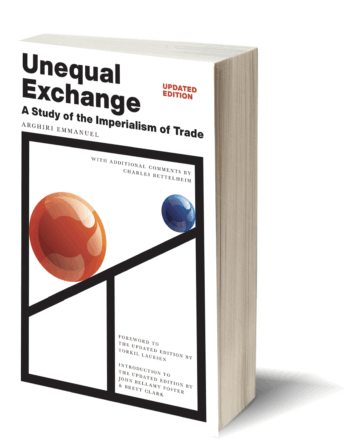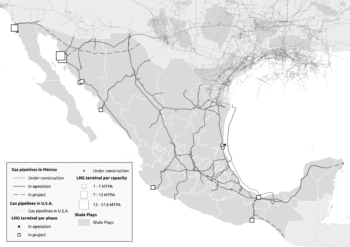February 1, 2026
In this talk from the inaugural conference of the Society for Peace, Internationalism, and Ecology, John Bellamy Foster relates the story of Prometheus, as presented in the plays of Aeschylus, to Western Marxism's "dialectic of defeat," in which capitalism is portrayed as an unbreakable bond for the working class. Instead, Foster says, we must recognize Prometheus as a subject who is freed from the seemingly inescapable fetters imposed upon him.
February 1, 2026
Using historical databases and quantitative analysis, Thomas E. Lambert calls into question the assertion that the trans-Atlantic slave trade can be considered a separate phenomenon from, rather than a major supporting factor in, the Industrial Revolution in England. Asserting otherwise, he writes, is a to deny "a horrifying and inhuman part of the global history of capitalism."
January 1, 2026
In this Introduction to the updated edition of
Unequal Exchange by Arghiri Emmanuel, published by Monthly Review Press, John Bellamy Foster and Brett Clark offer readers insight into the continuing influence of Emmanuel's seminal work. Through both deep understanding thoughtful critique, the authors deftly situate Emmanuel's text as an indispensable part of an enduring tradition of Marxist analysis of the global dynamics of labor.
January 1, 2026
David E. Perlman and Ashly Vigneault explore the linkages between humanity's metabolic rift with nature and the accelerating emergence of epidemics, which are fundamentally related to the capitalist mode of production and concomitant alienated social metabolism. Using historical and epidemiological research that extends from the rise of the bubonic plague to the emergence of COVID-19, Perlman and Vigneault are able to deftly tie these concepts to the breach of planetary boundaries that threatens all of humanity.
January 1, 2026
Mateo Crossa delineates the history of U.S. imperialism in Mexico through the lens of its domination of the fossil fuel industry, particularly by way of the Shale Revolution and the advent of fracking. "By engineering new regional dependencies and reshaping energy alliances to suit is strategic ambitions," Crossa writes, "the United States weaponized its command over natural gas to deepen its grip on the global fossil energy system and reinforce its imperial reach."
December 1, 2025
John Bellamy Foster introduces our special issue celebrating the life and work of
MR former coeditor and MR Press author Robert W. McChesney. In his recounting of over 50 years of close friendship and collaboration, Foster paints a portrait of McChesney as a visionary intellectual and activist whose work will reverberate through the communication field for decades to come.
December 1, 2025
Matthew Rothschild looks back on nearly 40 years working alongside his friend and colleague Robert W. McChesney. McChesney, he writes, brought to the world a sharp analysis of not only the contradiction between corporate media and democracy, but between the capitalist system as a whole and a true democracy that serves the people.
December 1, 2025
In this transcript of a talk from 2015, Robert W. McChesney discusses the "great definitional communication revolutions" that have shaped humanity's trajectory. Even a decade ago, McChesney was able to see the fraught relationship between new technology and democracy, the re-emergence of fascism, and the political dangers of the Digital Age.
December 1, 2025
In this reprint of a
Seattle Weekly article from 2004, Knute Berger details a game of Monopoly played among friends, including Robert W. McChesney and John Bellamy Foster, while students at The Evergreen College. With sly insight, Berger shows how Foster and McChesney's antics as board game robber barons revealed McChesney's perceptive analysis of the media landscape under capitalism and his passionate advocacy for democratic, monopoly-free media.
November 1, 2025
It is a commonplace that the world in the first quarter of the twenty-first century is facing multiple, multifaceted crises, threatening all world civilization and the future of humanity itself. So omnipresent is the contemporary world disorder that received ideology has settled on a single word to describe it: “polycrisis.” Anyone who wants to know what polycrisis is and where it comes from will inevitably run up against a blank wall. For the establishment, the vacuousness of the concept of polycrisis is its primary value.










